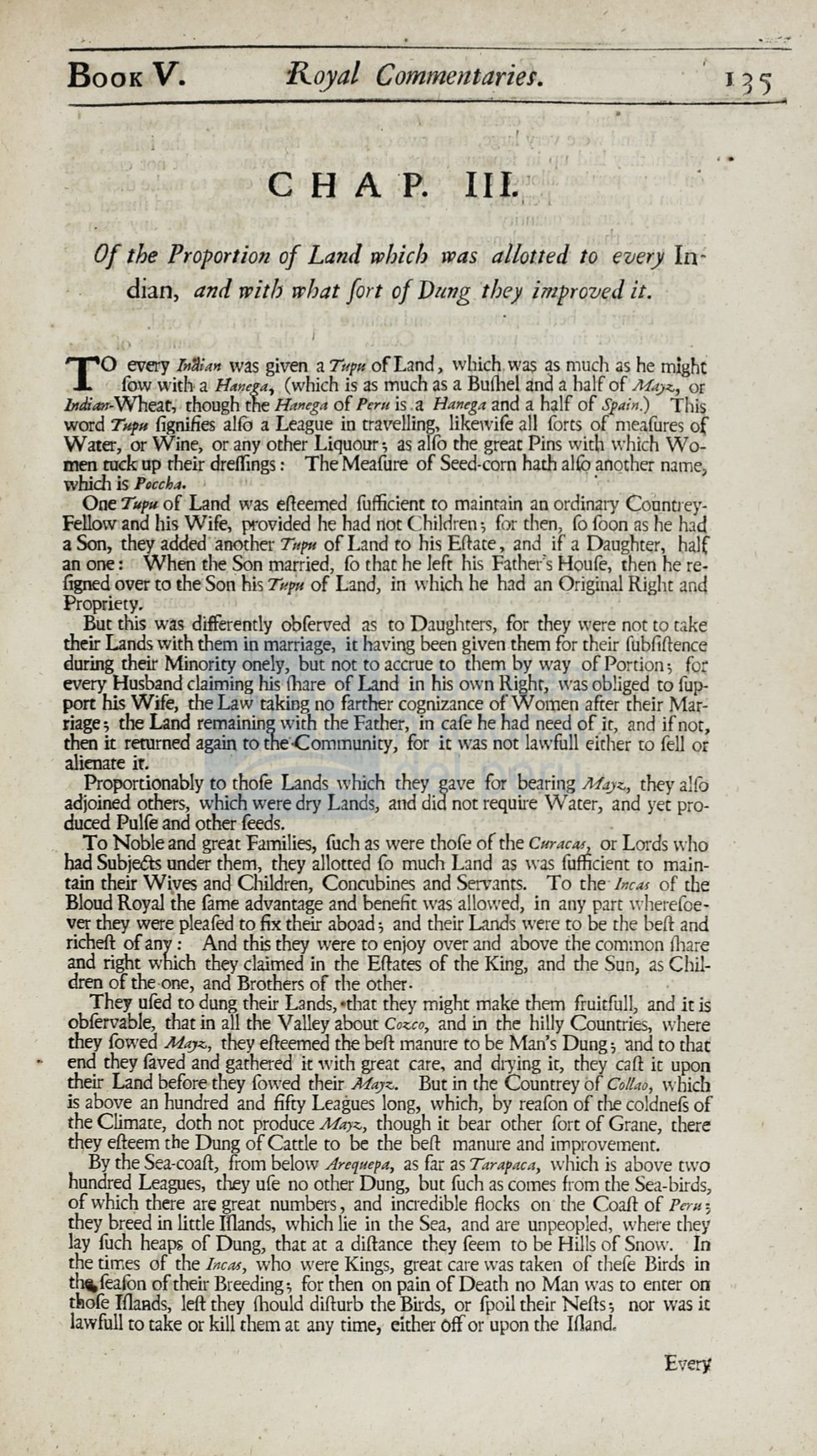

BooK
V.
,.. .
~
V
·¡
e~
;
1.J •'
CH A
·p. ·
.d
;1
Of the
Proportion
aj
Land whick was
~Úotted·
to
r
1
;very
In~
~ian,
and withºwhctt fort of Dung .
·1~ey
ir12:pro-«ed
it.'
T
o
evflJy
Mlvan
Wa$
given
a
Tupu
of
Land, w~1ichr
was
as rirnch
as
he rnlght
· fow
witbi,a1
Ha1:1ega,
.(
which
is
as much as a BufheI and a balf of
Mayz-,
or
.btdiaw-Wheat;,rhougll'~he
Hanega
of
P~ru
is .a'
Hanega
anda h
4
1f
of
Jpain.)
This
wo1;cl
Tupu
fignilies
alfü
a
League iu tra~el1.ling, likewife
atl
fotcs o( me¡ifures
of
Watei;i
or
Wine,
or.a-ily onher
Liquour;
as alfo che great Pins wicb which
W
o.:.
men
tmckiup their dreffi.ngs: The Meafure of Seed-corn hath al~ anqthet name,
which
is
FDccha.
1
'
• •
Oue
Tupu
of-Land,was efieemed fufficient to rnaimain an ordinary'Cou_ncrey–
FeJJl.ow-añd his Wife, provided he had not Children; far then,
fo
foori as
he had
a
Son, ·they a:dded·,ano,cher
Tupu
of Land
tó
his EA-ate~ and. if a Daµghc~r, balf
an
one:
When ~hé
Son i;narried,
fo
that he left his Fathér's Houíe, thert he re–
:fignedover to the·Son bis
Tupu
of bnd, in which he had an Original Right anq
Propriety..
.
Bue this wa:s. diiferently obferved as to Daughters, for they were not to cake
tlieir
Lands with them in marriage, it having been given.them for their íubíiíl-ence
Eiaring
theit
Minority onely, but nót to accrue to ihem by way of Portien; for
~ei,r Husband claiming his·íhare of Land in bis own Right, -was oblig~d
to
fup–
port
bis
Wife,
-the Law rakiflg no farther cognizance ofWomen afcer cheir Mar–
riage;
the Land rernainingwith the Father, in cafe he had need of
.ir,
and ifnor,
then it rerurned
again
to the·,Communicy; for it
w.asnot lawfull eicher
co
fell or
, alienare
it.
·
·
Proportionably to thofe Lands which they gave for bearing
Mayz.,
they alfo
adjoined others, which were dry Lands, and did not require
Vv
acer, aod yec
pro–
duced Pulfe and ocher feeds.
To Noble and great Families, fuch as were chofe of che
Curaclt!,
or
Lords who
had
Subjefu
under
them, they allotted
(o
rnuch Land as was fufficient to main–
tain
their Wives and Children, Concubines and Servants. To che·
inca.
of tbe
Bloud Royal the fame advantage and benefit was allowed, in any parr "' hereíoe–
ver
they were pleaíed to
fix
their aboad; and their Lartds were tQ be che beíl: and
richeíl: ofany : And chis they were to enjoy over and above the comrnon fhare
and right which they claimed in the Eíl:ates of the King, and the San, as
Chil-
dren of the-one, and Brothers of the other. .
.
1
_35 '
They uíed to dung their Lands, that they might make them fruitfull, and it is
obfervable, that
in
all che Valley about
Coáo,
and in the hilly Countrtes, where
they fowed
Mqyz.,
rhey efieemed the-beíl: manure to be Man's Dung; -and to chaé
end they faved and gal'hered·
i:t
wich great care, and drying ir, they cafi ic upon
their.Lamd before they fowed their.
.MayZJ.
But in the Counrrey of
Col!ao,
which
is
above an hundred and fifty Leagues long, which, by reafon of rhe coldnefs of
the Climate, doth not produce
Mayz-,
though it bear other forc of Grane, chere
t~ey efieem che Dung ofCattle
to
be the beíl: manure and irnprovemenr.
By the Sea-coaíl:, from below
Arequepa,
as far as
Tarapaca,
which is abov~ two
hundred Leagues, they uíe no other Dung,
bue
fuch as comes from the Sea-birds,
of whicl) there are great numbers, and incredible Bocks on· the Coafi of
Peru;
they b~eed in little ffiands, which lie in che Sea, and are unpeopled, where cb~y
lay fuch heap¡; of Dung, that at a diíl:ance they feem
to
be
Hills
of Snow. fo
rhe tirpes of the
Inca.,
who wer~ Kings, great care was taken of the[e Birds
in
th1,feafon
ofcheir Breeding; for chen on pain ofDeath no Man was
to
encer on ,
tlicfe Iílaeds, leíl: they íhould diíl:urb the Birds, or [poi! their Nefis; nor was
it
lawfull
to take
or
kill
th€m
at any time,· either
off
or 'upon che Iíland,
Ever}{














